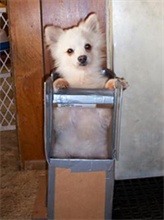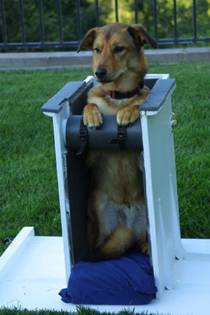 I get so many visitors to the site looking for information on Megaesophagus & Bailey Chairs, I’m updating the post. If your dog has just been diagnosed, I want you to know there are lots of people out there who are dealing with the same thing and want to share what they’ve learned.
I get so many visitors to the site looking for information on Megaesophagus & Bailey Chairs, I’m updating the post. If your dog has just been diagnosed, I want you to know there are lots of people out there who are dealing with the same thing and want to share what they’ve learned.
I recommend joining the Yahoo megaesophagus group—they’re active, responsive, & helpful. Look under “Files” for years worth of invaluable information on everything to do with megaeshophagus. There is now a Facebook support group for megaesophagus which is also active & growing.
Megaesophagus is a condition in which a dog’s esophagus is enlarged to the point that food remains in the esophagus and never makes it down to the stomach and is instead regurgitated. The muscle contraction and relaxation that normally takes place to move food down to the stomach doesn’t work. Megaesophagus can be present since birth or can develop in adult dogs. If left untreated, it can cause a range of problems, including starvation and aspiration pneumonia.
- You can find information at www.caninemegaesophagus.org
- The Mar Vista Vet site has a crash course on megaesophagus, including:
- how regurgitation differs from vomiting
- x-rays comparing a normal esophagus to a megaesophagus
- interactive videos demonstrating megaesophagus
- plus information on cause, diagnosis, & treatment
- Pet Place has very detailed megaesophagus information on:
- symptoms
- related conditions
- in-depth diagnosis
- treatment options
The Bailey Chair was designed by, Donna & Joe Koch, the owners of a dog (Bailey) diagnosed with megaesophagus. The dog sits in a “begging” position to eat, drink, or take medication and gravity does the work to bring what’s ingested to the stomach. There are a few ways you can acquire a Bailey Chair:
- The creators will send you a DVD or video of instructions for building your own Bailey Chair for $6.00 to cover costs. Send email to Matthew1@earthlink.net to inquire about the address. (Find out more in the Yahoo Megaesophagus Group.)
- eHow has instructions on how to build a Bailey Chair (thanks Yvette!)
- Oleisa & Neal Moor have started building the chairs and sell them for the cost of the materials. Scroll down to the bottom of this page for the info. and photos of the chairs. You can also find information on the Moor’s chairs in the Yahoo Megaesophagus Group & the Facebook Megaesophagus Page.
This “highchair” for dogs can be made of different materials and in different sizes to accommodate small and large dogs.


With proper eating position, diet, and medication, these dogs can have almost normal lives. Like Roxie, Rocket, Jasmine, Mattie, Diyoji, and in particular Tobin, whose caretakers’ describe their trials, errors, and successes in ongoing journal entries.
